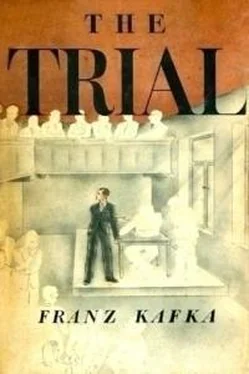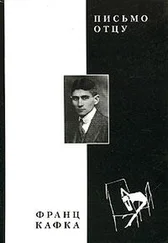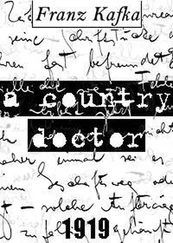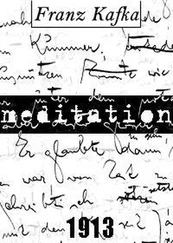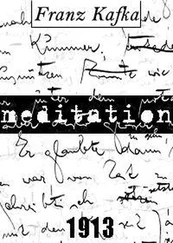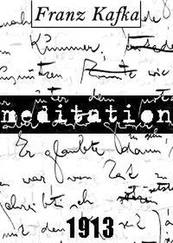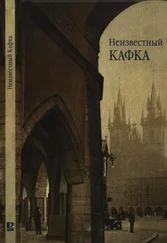Франц Кафка - The Trial
Здесь есть возможность читать онлайн «Франц Кафка - The Trial» — ознакомительный отрывок электронной книги совершенно бесплатно, а после прочтения отрывка купить полную версию. В некоторых случаях можно слушать аудио, скачать через торрент в формате fb2 и присутствует краткое содержание. Год выпуска: 2014, Издательство: epubBooks Classics, Жанр: Классическая проза, на английском языке. Описание произведения, (предисловие) а так же отзывы посетителей доступны на портале библиотеки ЛибКат.
- Название:The Trial
- Автор:
- Издательство:epubBooks Classics
- Жанр:
- Год:2014
- ISBN:нет данных
- Рейтинг книги:3 / 5. Голосов: 1
-
Избранное:Добавить в избранное
- Отзывы:
-
Ваша оценка:
- 60
- 1
- 2
- 3
- 4
- 5
The Trial: краткое содержание, описание и аннотация
Предлагаем к чтению аннотацию, описание, краткое содержание или предисловие (зависит от того, что написал сам автор книги «The Trial»). Если вы не нашли необходимую информацию о книге — напишите в комментариях, мы постараемся отыскать её.
The Trial — читать онлайн ознакомительный отрывок
Ниже представлен текст книги, разбитый по страницам. Система сохранения места последней прочитанной страницы, позволяет с удобством читать онлайн бесплатно книгу «The Trial», без необходимости каждый раз заново искать на чём Вы остановились. Поставьте закладку, и сможете в любой момент перейти на страницу, на которой закончили чтение.
Интервал:
Закладка:
He shook his head at the thought of it once more as the servitor came up beside him and drew his attention to the three gentlemen who were waiting on a bench in the ante–room. They had already been waiting to see K. for a long time. Now that the servitor was speaking with K. they had stood up and each of them wanted to make use of the opportunity to see K. before the others. It had been negligent of the bank to let them waste their time here in the waiting room, but none of them wanted to draw attention to this. "Mr. K., … " one of them was saying, but K. had told the servitor to fetch his winter coat and said to the three of them, as the servitor helped him to put it on, "Please forgive me, gentlemen, I'm afraid I have no time to see you at present. Please do forgive me but I have some urgent business to settle and have to leave straight away. You've already seen yourselves how long I've been delayed. Would you be so kind as to come back tomorrow or some time? Or perhaps we could settle your affairs by telephone? Or perhaps you would like to tell me now, briefly, what it's about and I can then give you a full answer in writing. Whatever, the best thing will be for you to come here again." The gentlemen now saw that their wait had been totally pointless, and these suggestions of K.'s left them so astounded that they looked at each other without a word. "That's agreed then, is it?" asked K., who had turned toward the servitor bringing him his hat. Through the open door of K.'s office they could see that the snowfall outside had become much heavier. So K. turned the collar of his coat up and buttoned it up high under his chin. Just then the deputy director came out of the adjoining room, smiled as he saw K. negotiating with the gentlemen in his winter coat, and asked, "Are you about to go out?" "Yes," said K., standing more upright, "I have to go out on some business." But the deputy director had already turned towards the gentlemen. "And what about these gentlemen?" he asked. "I think they've already been waiting quite a long time." "We've already come to an understanding," said K. But now the gentlemen could be held back no longer, they surrounded K. and explained that they would not have been waiting for hours if it had not been about something important that had to be discussed now, at length and in private. The deputy director listened to them for a short while, he also looked at K. as he held his hat in his hand cleaning the dust off it here and there, and then he said, "Gentlemen, there is a very simple way to solve this. If you would prefer it, I'll be very glad to take over these negotiations instead of the chief clerk. Your business does, of course, need to be discussed without delay. We are businessmen like yourselves and know the value of a businessman's time. Would you like to come this way?" And he opened the door leading to the ante–room of his own office.
The deputy director seemed very good at appropriating everything that K. was now forced to give up! But was K. not giving up more than he absolutely had to? By running off to some unknown painter, with, as he had to admit, very little hope of any vague benefit, his renown was suffering damage that could not me repaired. It would probably be much better to take off his winter coat again and, at the very least, try to win back the two gentlemen who were certainly still waiting in the next room. If K. had not then glimpsed the deputy director in his office, looking for something from his bookshelves as if they were his own, he would probably even have made the attempt. As K., somewhat agitated, approached the door the deputy director called out, "Oh, you've still not left!" He turned his face toward him – its many deep folds seemed to show strength rather than age – and immediately began once more to search. "I'm looking for a copy of a contract," he said, "which this gentleman insists you must have. Could you help me look for it, do you think?" K. made a step forward, but the deputy director said, "thank you, I've already found it," and with a big package of papers, which certainly must have included many more documents than just the copy of the contract, he turned and went back into his own office.
"I can't deal with him right now," K. said to himself, "but once my personal difficulties have been settled, then he'll certainly be the first to get the effect of it, and he certainly won't like it." Slightly calmed by these thoughts, K. gave the servitor, who had already long been holding the door to the corridor open for him, the task of telling the director, when he was able, that K. was going out of the bank on a business matter. As he left the bank he felt almost happy at the thought of being able to devote more of himself to his own business for a while.
He went straight to the painter, who lived in an outlying part of town which was very near to the court offices, although this area was even poorer, the houses were darker, the streets were full of dirt that slowly blew about over the half–melted snow. In the great gateway to the building where the painter lived only one of the two doors was open, a hole had been broken open in the wall by the other door, and as K. approached it a repulsive, yellow, steaming liquid shot out causing some rats to scurry away into the nearby canal. Down by the staircase there was a small child lying on its belly crying, but it could hardly be heard because of the noise from a metal–workshop on the other side of the entrance hall, drowning out any other sound. The door to the workshop was open, three workers stood in a circle around some piece of work that they were beating with hammers. A large tin plate hung on the wall, casting a pale light that pushed its way in between two of the workers, lighting up their faces and their work–aprons. K. did no more than glance at any of these things, he wanted to get things over with here as soon as possible, to exchange just a few words to find out how things stood with the painter and go straight back to the bank. Even if he had just some tiny success here it would still have a good effect on his work at the bank for that day. On the third floor he had to slow down his pace, he was quite out of breath – the steps, just like the height of each floor, were much higher than they needed to be and he'd been told that the painter lived right up in the attic. The air was also quite oppressive, there was no proper stairwell and the narrow steps were closed in by walls on both sides with no more than a small, high window here and there. Just as K. paused for a while some young girls ran out of one of the flats and rushed higher up the stairs, laughing. K. followed them slowly, caught up with one of the girls who had stumbled and been left behind by the others, and asked her as they went up side by side, "Is there a painter, Titorelli, who lives here?" The girl, hardly thirteen years old and somewhat hunchbacked, jabbed him with her elbow and looked at him sideways. Her youth and her bodily defects had done nothing to stop her being already quite depraved. She did not smile once, but looked at K. earnestly, with sharp, acquisitive eyes. K. pretended not to notice her behaviour and asked, "Do you know Titorelli, the painter?" She nodded and asked in reply, "What d'you want to see him for?" K. thought it would be to his advantage quickly to find out something more about Titorelli. "I want to have him paint my portrait," he said. "Paint your portrait?" she asked, opening her mouth too wide and lightly hitting K. with her hand as if he had said something extraordinarily surprising or clumsy, with both hands she lifted her skirt, which was already very short, and, as fast as she could, she ran off after the other girls whose indistinct shouts lost themselves in the heights. At the next turn of the stairs, however, K. encountered all the girls once more. The hunchbacked girl had clearly told them about K.'s intentions and they were waiting for him. They stood on both sides of the stairs, pressing themselves against the wall so that K. could get through between them, and smoothed their aprons down with their hands. All their faces, even in this guard of honour, showed a mixture of childishness and depravity. Up at the head of the line of girls, who now, laughing, began to close in around K., was the hunchback who had taken on the role of leader. It was thanks to her that K. found the right direction without delay – he would have continued up the stairs straight in front of him, but she showed him that to reach Titorelli he would need to turn off to one side. The steps that led up to the painter were especially narrow, very long without any turning, the whole length could be seen in one glance and, at the top, at Titorelli's closed door, it came to its end. This door was much better illuminated than the rest of the stairway by the light from a small skylight set obliquely above it, it had been put together from unpainted planks of wood and the name 'Titorelli' was painted on it in broad, red brushstrokes. K. was no more than half way up the steps, accompanied by his retinue of girls, when, clearly the result of the noise of all those footsteps, the door opened slightly and in the crack a man who seemed to be dressed in just his nightshirt appeared. "Oh!" he cried, when he saw the approaching crowd, and vanished. The hunchbacked girl clapped her hands in glee and the other girls crowded in behind K. to push him faster forward.
Читать дальшеИнтервал:
Закладка:
Похожие книги на «The Trial»
Представляем Вашему вниманию похожие книги на «The Trial» списком для выбора. Мы отобрали схожую по названию и смыслу литературу в надежде предоставить читателям больше вариантов отыскать новые, интересные, ещё непрочитанные произведения.
Обсуждение, отзывы о книге «The Trial» и просто собственные мнения читателей. Оставьте ваши комментарии, напишите, что Вы думаете о произведении, его смысле или главных героях. Укажите что конкретно понравилось, а что нет, и почему Вы так считаете.
